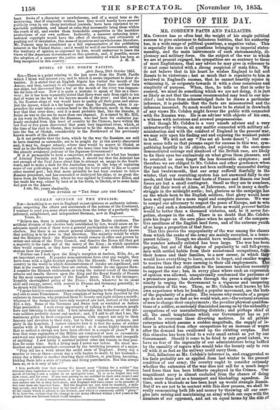GERMAN OPINION OF THE ENGLISH.
Sin—As nothing is so rare in England as just opinions or authentic inform- ation respecting the affairs and sentiments of the nations of the Continent, I venture to send you some short extracts from the letter of a perfectly well- ,informed, enlightened, and independent German, now in England.
Yours, &c.
"Believe me, there is nothing important in the Berlin elections. The artificial division of the elective body established by law, would cause an in- adequate result even if there were a.general participation on the part of the electors. But there is an almost general abstinence ; for everybody knows that nothing is to be done in that direction. The majority would be white And the Ministry black : the Ministers would remain in office and govern by orders and edicts of the Privy Council, and dissolve the House till theyset .a majority to the taste and at the mercy of the King ; in which operation they would succeed, as they have succeeded under more difficult circum- stances than the present. * • *
"Neither can I look upon the King's reception at Aachen, Köln, &c., as an important event. If popular demonstrations have ever any weight, they have none with a light-hearted people like the Rhenish. There is only one country in the world in which demonstrations of loyalty aresignificant, and that is the country in which they are useless, because no one opposes them. consider the Rhenish enthusiasm as being the natural result of the insane attacks and insults thrown upon the Xing and the Royal Family of Prussia by the most conspicuous part of the English press. This is the incompre- hensibly shortsighted policy of the Times ; which, whatever be its usual skill and energy, seems, with respect to Prussia and Germany generally, to
be struck with blindness. * * "I spoke lately to some countrymen of mine belonging to the Foreign Legion, and also to some Frenchmen. They complain of having been deceived by the enlisters in America, who promised them 6/.'bounty and eight dollars a month ; whereas of the former they have only received one half, instead of the latter Md. a day. Some of the Germans and Swiss look as wretched as forlorn hope personified. I seek every opportunity of talking to the common people here and listening to their talk. I find invariably the behaviour of the pri- vate soldiers perfectly decent and modest; and, if I add to all that I see, the testimony given by most competent persona, with respect not only to their bravery and devotion to their duty, but to their resignation, patience, and i
piety in the hospitals, I cannot conceive how it is that the name of soldier carries with it in England a sort of stain ; as it seems highly improbable that so radical a change can have been effected in a couple of years.* It is true that some regiments of the Militia are composed of men so excessively awkward and stupid-looking, that they appear equally capable and incapable of anything: I saw lately a sentinel present arms and remain in that posi- tion for some time. Such a living man I never saw before. He stood mo- tionless and open-mouthed—overawed by the terrifying presence of a major. "Pray tell me a word about the social state of England. Every day a murder or two or three—every day a wife beaten to death by her husband— every day a father or mother starving their children, or pinching, knocking, kicking them into a state of torture and living putrefaction. Has this always been so, or is it only of late ? "
• It is perfectly true that among tl:e decent poor "listing for a soldier" has hitherto been regarded as the resource of the idle and good-for-nothing. Mothers speak of having a son a soldier in an apologetic tone. It is to be hoped this will now cease, and for ever. If any men among- us are entitled to their own respect and the respect of all their countrymen, it is our soldiers. Let all of us do our duty and endure our lot as they have done, and England will have cause to be prouder of her sons than the has ever been. But the English are not, God be thanked, a mili- tary people, and will never find in the trade of a soldier that enormous gratification of the vanity which it affords to the French, and which is commonly called "glory." It is, however, certain that the change in our Army effected within a few years isIm greater than our German friend could imagine.


























 Previous page
Previous page